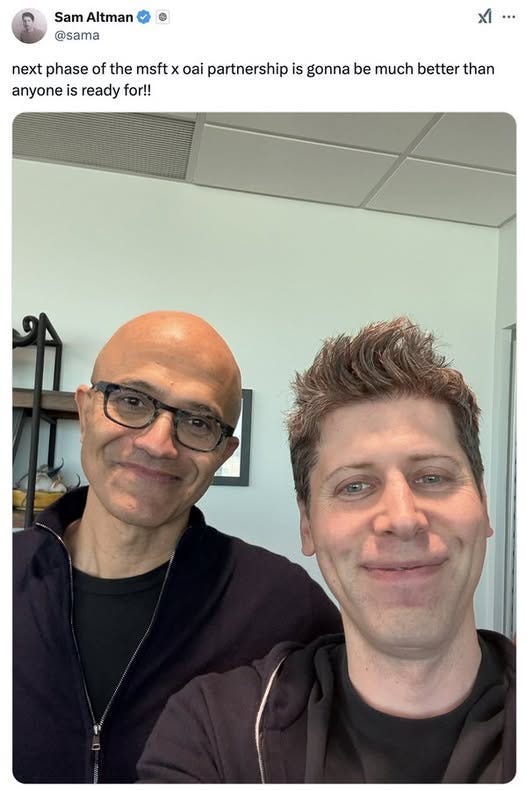🚨 OpenAI vs. DeepSeek: A Landmark Battle Over AI Knowledge Distillation and Intellectual Property 🚨
In a surprising turn of events, OpenAI has publicly accused DeepSeek of illicitly distilling knowledge from its proprietary models. This move not only raises critical questions about the boundaries of AI development but also sets the stage for a potentially groundbreaking legal showdown. Here's what every AI enthusiast and professional needs to know:
🔍 1. Understanding Knowledge Distillation in AI
Knowledge distillation is a pivotal machine learning technique aimed at enhancing efficiency without sacrificing performance. As defined by IBM:
"Knowledge distillation is a machine learning technique that aims to transfer the learnings of a large pre-trained model, the 'teacher model,' to a smaller 'student model.' It’s used in deep learning as a form of model compression and knowledge transfer, particularly for massive deep neural networks."
Key Points:
Objective: Train a compact model (student) to emulate the behavior of a larger, more complex model (teacher).
Process: Unlike traditional training, which aligns a model's predictions with labeled data, distillation focuses on mimicking the teacher's output, effectively transferring "knowledge."
📜 2. OpenAI's Terms of Use: What's Off-Limits
OpenAI has stringent guidelines to protect its intellectual property and ensure ethical usage of its services. Key prohibitions include:
Intellectual Property Violations:
"You may not use our Services in a way that infringes, misappropriates or violates anyone’s rights."
"Attempt to or assist anyone to reverse engineer, decompile or discover the source code or underlying components of our Services."
"Use Output to develop models that compete with OpenAI."
Data and Output Restrictions:
"Automatically or programmatically extract data or Output."
"Represent that Output was human-generated when it was not."
Service Integrity:
"Interfere with or disrupt our Services, including circumventing rate limits or bypassing safety measures."
Implications for DeepSeek: If OpenAI successfully proves that DeepSeek engaged in knowledge distillation that violates these terms, it could lead to severe legal repercussions, especially given the international dynamics—OpenAI is based in the U.S., while DeepSeek operates out of China.
🌐 3. The Unexpected IP Stance from OpenAI
Plot Twist: OpenAI, which initially built its reputation by leveraging vast amounts of publicly available data (often scraped without explicit consent), is now championing a strong intellectual property (IP) stance. This shift is both surprising and legally intriguing.
Key Observations:
A. Knowledge Distillation: A Legal Gray Area
Nature of Distillation: It doesn't involve direct copying of model weights but rather the transfer of behavior.
Legal Question: Does this process constitute reverse engineering? While OpenAI's terms prohibit such actions, if DeepSeek trained its own models to emulate OpenAI's outputs without decompiling, the legality remains murky.
Precedent Potential: If OpenAI argues that "output scraping + training a competing model" violates its terms, it could set a significant legal precedent in the AI industry. However, proving this beyond doubt is challenging.
B. Jurisdictional Complexities
Geopolitical Tensions: With OpenAI in the U.S. and DeepSeek in China, the existing technological cold war adds layers of complexity.
Enforcement Challenges: Even with a solid case, enforcing legal rulings across international borders is a formidable hurdle.
Divergent IP Norms: China's distinct IP enforcement standards could further complicate matters, potentially escalating the issue into a geopolitical dispute.
C. Ripple Effects in the Tech Industry
Potential Precedent: A win for OpenAI could deter open AI research and embolden other companies like Google or Meta to file similar claims.
Competitive Landscape: Conversely, a loss might signal that AI models aren't robustly protectable under current IP laws, encouraging more competitors to adopt distillation techniques.
D. The Hypocrisy Debate
Transparency vs. Protection: OpenAI has long cited competitive risks to justify its resistance to full transparency. However, if OpenAI benefited from data scraping (e.g., from Reddit, Stack Overflow, GitHub), its current IP stance might appear contradictory.
Data Source Scrutiny: OpenAI's claims about unique model signatures or specific output traces could prompt deeper investigations into its own data acquisition practices.
⚖️ 4. The Road Ahead: Legal and Industry Implications
If OpenAI pursues legal action against DeepSeek, we could witness the first major legal battle over AI model ownership. This case has the potential to:
Redefine AI Training Practices: Clarify the boundaries of permissible knowledge transfer and model training techniques.
Shape IP Protection for AI: Establish how abstract concepts like "knowledge" are protected under current intellectual property laws.
Influence Global AI Policies: Affect international collaborations and competition in the AI sector, especially between major players in the U.S. and China.
Moreover, this conflict might compel OpenAI to re-evaluate its branding. The term "Open" in OpenAI could come under scrutiny if the organization moves towards a more closed and protective stance.
🤔 What This Means for the Future of AI
The OpenAI vs. DeepSeek dispute is more than a corporate feud—it's a crucial test case that will define the legal landscape of AI development. Stakeholders across the AI ecosystem should closely monitor this situation, as its outcome could have lasting impacts on:
Model Development Practices: Guidelines on what constitutes fair use versus infringement in AI training.
International AI Collaboration: How cross-border legal disputes are managed in the increasingly globalized AI industry.
Intellectual Property Law Evolution: Potential reforms to accommodate the unique challenges posed by AI technologies.
📢 Join the Conversation!
What are your thoughts on OpenAI's aggressive IP stance and its implications for the future of AI? Do you believe knowledge distillation should be considered reverse engineering, or is it a legitimate method for model optimization? Share your insights and let's discuss the potential outcomes of this landmark case!
🔗 References:





https://www.humsub.com.pk/578695/syed-salman-mehdi-7/